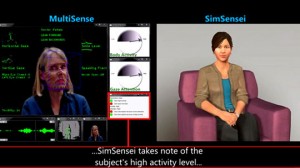
Believe it or not, the time has come when a computers will be aiding humans in emotional matters.
The Malaysian Insider reported on a new type of therapy that is on the horizon. Scientists in the US have developed a 3D simulated therapist who can analyze facial expressions, body language and speech to test for depression.
This new type of therapist, SimSensei, is still in it’s early phases and uses regular hardware to pull off this futuristic therapy session.
SimSensei is equipped with a webcam and Kinect sensors to access people’s body language, as well as facial recognition software to read facial expressions — a downward gaze, shifting in the seat — to glean insights into a person’s mental state.
The research was developed out of a project with Darpa, the Pentagon’s research arm, to detect whether or not soldiers are suffering from post-traumatic stress disorder.
The concept, however of SimSensei, isn’t to replace traditional therapy or treat patients, but just to diagnose mental health issues. A person’s diagnosis depends on how they respond to standard questions about their well-being, so the programme is not quite ready for popular use, point out researchers at the University of Southern California Institute for Creative Technologies.
For example, a soldier could walk into a clinic, enter a private kiosk, and log on to a computer where a personal simulated therapist — with soldiers able to select among avatars — would guide him or her through a chat.
Screenshot of SimSensei programme on YouTube.